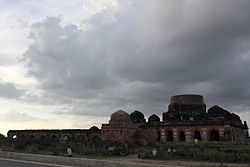Kalpi Kalpriya | |
|---|---|
 South facing view of Chaurasi Gumbad | |
| Coordinates: 26°07′N79°44′E / 26.12°N 79.73°E | |
| Country | India |
| State | Uttar Pradesh |
| District | Jalaun |
| Established | recaptured by Delhi Sultanate |
| Founded by | Vasu Dev (Rajput monarch of Kanauj) [1] |
| Government | |
| • Type | Municipality |
| • Body | Nagar Palika Parishad |
| • Chairman | Baikunthi Devi |
| Elevation | 112 m (367 ft) |
| Population (2011) | |
• Total | 51,670 |
| Languages | |
| • Official | Hindi |
| Time zone | UTC+5:30 (IST) |
| PIN | 285204 [2] |
| Vehicle registration | UP 92 |
| Website | up |


Kalpi is a historical city and municipal board in Jalaun district in Uttar Pradesh, India. It is on the right bank of the Yamuna. [3] It is situated 78 kilometres south-west of Kanpur from which it is connected by both road and rail.





